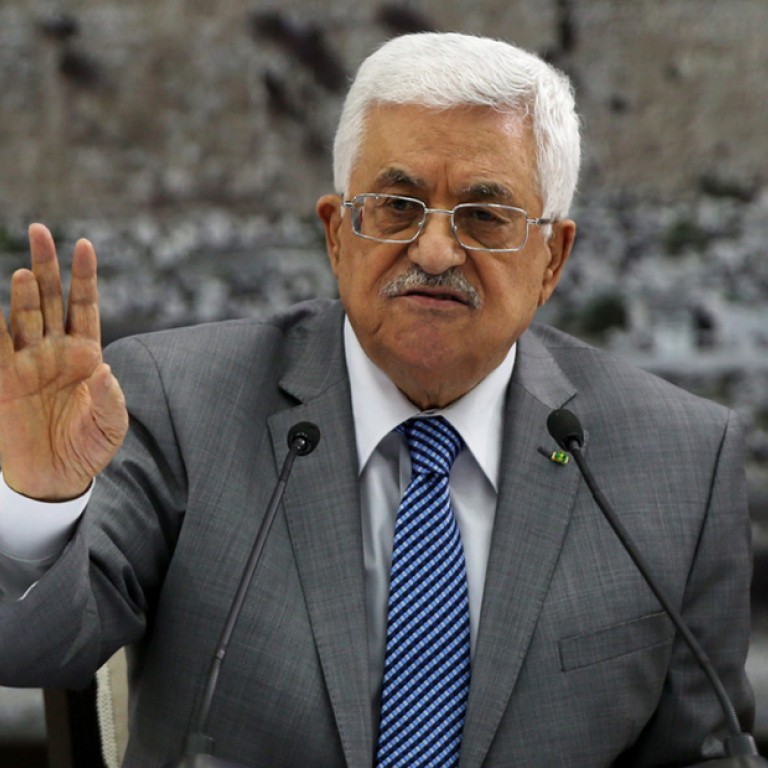
Palestinian leader Mahmoud Abbas the big loser in Gaza-Israel conflict
Fatah leader relegated to sidelines and losing support in the West Bank
After days of around-the-clock rocket and missile fire that has left more than 125 Palestinians dead and several Israelis injured, the latest bout of fighting in and around the Gaza Strip has produced no clear winners.
But it has yielded a nearly indisputable loser: Palestinian Authority president Mahmoud Abbas, who this spring was Israel's partner in US-brokered peace talks but has now been relegated to bystander status as his two long-time foes once again slug it out.
In the West Bank, where Abbas and his allies have long held sway among Palestinians, residents speak admiringly of the Islamist militant group Hamas, which controls Gaza, while despairing that Abbas' advocacy for non-violence has led nowhere.
"You look at the number and quality of Hamas rockets, and the training of their fighters, and I think even Hezbollah must be jealous," said Jamal Hamdan, a 50-year-old electrical engineer. "As for Abbas, it's like he's shy. We expect more from him."
The overall impact is the opposite of what the United States has long sought - a strengthened hand for Abbas and marginalisation for Hamas and other militant Middle East groups.
Bitter aides of Abbas acknowledge that the president is fast losing relevance, but they say this is what Israel intended all along: hopeless negotiations followed by a fight that would elevate militant Palestinian elements at the expense of relative moderates.
"The objective of this war for Israel is political revenge against Mahmoud Abbas," said Husam Zomlot, a top foreign-policy official in Abbas' secular Fatah party. "Israel wants to pull all of us into the military arena, because that's where they have the advantage."
Israel hotly denies that, arguing it was forced into the current conflict by indiscriminate rocket fire from the Gaza Strip that has been condemned by leaders the world over.
Israeli Prime Minister Benjamin Netanyahu, who has brushed off calls for a ceasefire, said in a speech on Friday that Israel had hit more than 1,000 militant targets in Gaza in recent days and that the operation "will continue until we can be certain that the quiet has returned to Israeli citizens".
Given a Hamas arsenal estimated to contain many thousands of rockets, that may be a long time in coming.
Before the operation, Hamas had reached out to Fatah for a lifeline, inking a once-unthinkable deal that united the bitter rivals under a Palestinian unity government that would ostensibly return Abbas' authority to Gaza seven years after Hamas kicked the Fatah leadership out.
The unity government might have benefited Abbas. It angered the Israelis, stirred hope among Palestinians and helped Abbas and his party save face after nine fruitless months of US-brokered peace negotiations.
But the battle between Israel and Hamas has laid bare just how little impact the unity deal had.
Abbas has virtually no presence in Gaza, and he lacks the ability to influence events there.
"Reconciliation did not achieve anything for Gaza. The unity government exists on paper, but none of us can see it. There is no evidence of unity," said Mustafa al-Sawwaf, a writer and analyst in Gaza with close ties to Hamas.
Hamas leaders complain that Abbas and the new government in Ramallah have done nothing for them.
Meanwhile, some 40,000 government employees in Gaza, who were hired by Hamas, have not been paid their salaries in months, receiving only a small stipend during the long delay.
"I don't think Abu Mazen [Abbas] can continue the way things are now," said Ziad Abu Ein, a senior Fatah leader.
"We need an agenda to end the Israeli occupation. Otherwise there will be no peace."
